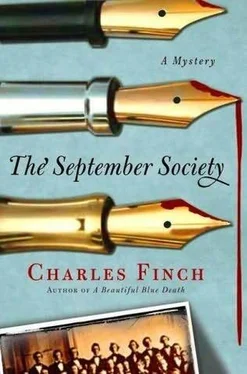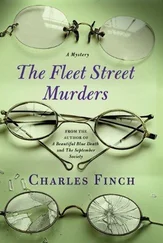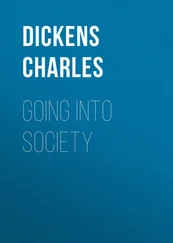Charles Finch - The September Society
Здесь есть возможность читать онлайн «Charles Finch - The September Society» весь текст электронной книги совершенно бесплатно (целиком полную версию без сокращений). В некоторых случаях можно слушать аудио, скачать через торрент в формате fb2 и присутствует краткое содержание. Жанр: Исторический детектив, на английском языке. Описание произведения, (предисловие) а так же отзывы посетителей доступны на портале библиотеки ЛибКат.
- Название:The September Society
- Автор:
- Жанр:
- Год:неизвестен
- ISBN:нет данных
- Рейтинг книги:4 / 5. Голосов: 1
-
Избранное:Добавить в избранное
- Отзывы:
-
Ваша оценка:
- 80
- 1
- 2
- 3
- 4
- 5
The September Society: краткое содержание, описание и аннотация
Предлагаем к чтению аннотацию, описание, краткое содержание или предисловие (зависит от того, что написал сам автор книги «The September Society»). Если вы не нашли необходимую информацию о книге — напишите в комментариях, мы постараемся отыскать её.
The September Society — читать онлайн бесплатно полную книгу (весь текст) целиком
Ниже представлен текст книги, разбитый по страницам. Система сохранения места последней прочитанной страницы, позволяет с удобством читать онлайн бесплатно книгу «The September Society», без необходимости каждый раз заново искать на чём Вы остановились. Поставьте закладку, и сможете в любой момент перейти на страницу, на которой закончили чтение.
Интервал:
Закладка:
“Back already, Mr. Lenox?”
“I’m afraid so, Mrs. Tate. Could I have a room?”
“Why, of course,” she said. “Anything to eat?”
“That’s all right, thanks. I suppose I only need some sleep.”
She looked at him sympathetically. “All right,” she said. “You know where the room is. Here’s the key.”
Tramping up the staircase again, Lenox felt none of the same thrill of return. The room now seemed bare and comfortless, too small, the memories it held inconsequential. As he sat in the hard, narrow chair by the window, he was full of the deepest self-recrimination he had ever felt. The starless sky refused to return his gaze, absorbing the darkness of his thoughts: She would never consent to marry him, and quite rightly. What was he? A small-time detective, pretending he was better than those who did the same job for their bread and butter.
He sat by the window for half an hour and then stood up with a sigh and went to the bureau to unpack his suitcase. He did so listlessly, doing a job so untidy that Graham would have cringed to see it, and wondered if he could remember that other old ghost story about the Turf. Yes, of course he could. He would never forget it.
Lenox had been quite close with his grandfather, his mother’s father, the 3rd Marquess of Lansdowne, and often visited him at Bowood House, the Lansdowne family seat in Wiltshire. This was long past the days when the marquess had been the Member of Parliament for Cambridge University and served as chancellor of the exchequer. By then he spent most of his time in his large library, compiling his memoirs and reading. He was a tall, wrinkled, mischievous old man with snow white hair and an endless succession of stories.
One of them was about the dirt hauling lane behind the Turf, where the local farms’ animals tracked on their way across the city to the butcher’s. A boy, Samuel, was returning from the butcher, having dropped off a flock of sheep there, when by the back door of the Turf two menacing gents had appeared, drunk and restive.
“What do ye want?” Samuel had shouted at them preemptively. Lenox could hear his grandfather imitating the voice.
“You have yer butcher money there, isn’t it?” said one of the men, and a moment later both had started walking toward him.
At that instant, a massive black dog, something like a Great Dane, had materialized (the boy swore) out of thin air and started growling at the two men, standing between them and the boy. The men had leapt back into the Turf’s doorway, cursing the dog and the boy alike, and let them pass safely. Then the boy had run all the way through the city, past the dim colleges and murmuring pubs, until he reached the fields on the other side of town, by the river. The dog had run with him all the way, but there he stopped, immovable.
“What?” Samuel had said. All the dog did was nuzzle the fence they stood by and stamp on the ground over and over. “What?” the boy asked again, and the dog had put his nose to the same spot. So Samuel had marked it with a stick by the side of the road, and as soon as that was done the dog had vanished, again (the boy swore) into thin air.
The next morning, after he had safely deposited the money with the farmer, the boy had gone back to the spot by the fence and dug a hole. About three feet down he found a dog’s bones. In the rib cage was a small box, and in the box were forty gold pieces. A few years later, at the age of sixteen, Samuel had used them to buy the Turf Tavern.
The old myths. There was some small relief in the memory of them, in the memory of his grandfather. But it passed, and Lenox went to bed that evening caught in a world of his own ghosts, his own dead, thinking of the newest in their number-poor George Payson, who didn’t even have the blessing of sorrow anymore.
CHAPTER SIXTEEN
E nough. That was Lenox’s first thought when he woke up in the morning. Would it serve the dead to indulge in any further self-recrimination? Of course it wouldn’t. Solving the case was the only thing he could do of any consequence. When he had made this decision the room seemed like a brighter place, and after he had called down for a pot of coffee Lenox sat at the small table and wrote out a list of information in his notebook.
He wrote:
Clues in the Death of George Payson
• 1) The cat and its peculiar death. • 2) x12/43 21 31 25/x2 • 3) Letter opener, initial P. • 4) Frayed string; pen; tomato; all red, in unlikely spot. • 5) Disrupted line of ash by the window. • 6) September Society card, black and pink? on reverse. (Unlikely to doodle in two colors…) • 7) Muddied walking boots (on the chair) and walking stick. (GP the type to take long walks?) • 8) Hatch’s two lies.
Having written this out, he sat and thought for a few more moments, tapping his pen on the table, then stood up to change into his morning suit. He was due to meet McConnell soon, and didn’t want to be late. The eight clues rattled around in his mind the entire time he dressed.
McConnell was sitting at a table by the window at the Randolph Hotel that overlooked the Ashmolean. When Lenox came into the room, the doctor stood up and met him, subtly searching his face for the sorrow that had been there the night before. All at once Lenox, disconcerted, realized that it must have been the look McConnell constantly received, the reason his eyes were so often cast aside when he sipped from his flask.
“Well, you look a thousand times better, old chap,” said the doctor.
“Nothing like hard work to lift your spirits, you know. I’ve had a conversation with myself-abominably long-winded one, too-and decided to solve the case.”
“There’s the spirit of Agincourt,” said McConnell with a laugh. “A Lenox on the front lines there, I bet.”
“Twinging the arrows around, that’s right.” Lenox laughed too. “But look here, what happened last night?”
“Ah-about that, why don’t we gulp something down, and then I’d like to take you over to see someone.”
“Who’s that?”
“Better to leave it.”
“That’s awfully mysterious.”
“Not especially,” said McConnell with a smile, “but I want to have a bite of breakfast, and I know you’ll be dragging me off before the fish course if you begin thinking about the case.”
They ate their eggs and rashers quickly, washing them down with tea and talking only about McConnell’s next cataloging expedition north-the doctor had a particular hope of finding an unclassified and possibly apocryphal sea otter rumored to live in the Fjords-and when they had laid down their forks and knives both men lit cigarettes.
“Go on, then,” Lenox said. “Release me from the suspense.”
“They’ll let you look at the crime scene in the meadow.”
“Thomas! How on earth did they consent to that?”
“By pure chance I knew the coroner assigned to the body, a chap named Alfred Morris. Rather grim fellow, you know, but we studied at St. Bart’s Hospital together. I asked if I might help, and he said I could willingly enough.”
“Why?”
“Probably wanted to make certain that he didn’t bungle the thing, second set of eyes and all that. They don’t have many murders up here. At any rate, I can tell you about the body later.” After saying this McConnell stubbed out his cigarette, stood up, and motioned for the check. “Just put it on room 312, would you?” he said to the waiter. “What’s more important for the moment is that after Morris and I looked over the body, we went to meet Inspector Goodson, and I talked him around to letting you in on the work. Dropped a few names-the Marbury case, Soames, that small job you did for Buckingham Palace-and in the end he was quite pleased to have you in town.”
Читать дальшеИнтервал:
Закладка:
Похожие книги на «The September Society»
Представляем Вашему вниманию похожие книги на «The September Society» списком для выбора. Мы отобрали схожую по названию и смыслу литературу в надежде предоставить читателям больше вариантов отыскать новые, интересные, ещё непрочитанные произведения.
Обсуждение, отзывы о книге «The September Society» и просто собственные мнения читателей. Оставьте ваши комментарии, напишите, что Вы думаете о произведении, его смысле или главных героях. Укажите что конкретно понравилось, а что нет, и почему Вы так считаете.












